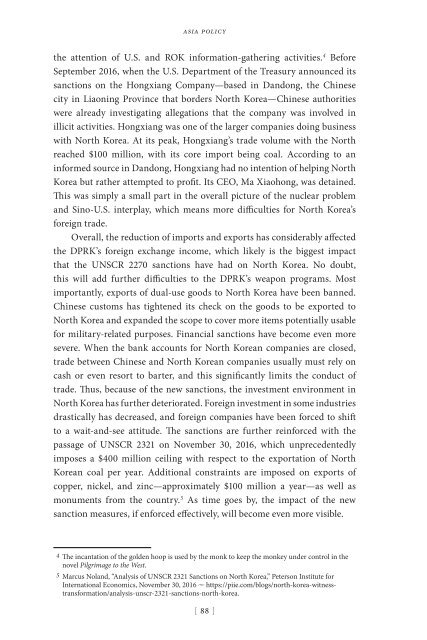2jBVKVf
2jBVKVf
2jBVKVf
Create successful ePaper yourself
Turn your PDF publications into a flip-book with our unique Google optimized e-Paper software.
asia policy<br />
the attention of U.S. and ROK information-gathering activities. 4 Before<br />
September 2016, when the U.S. Department of the Treasury announced its<br />
sanctions on the Hongxiang Company—based in Dandong, the Chinese<br />
city in Liaoning Province that borders North Korea—Chinese authorities<br />
were already investigating allegations that the company was involved in<br />
illicit activities. Hongxiang was one of the larger companies doing business<br />
with North Korea. At its peak, Hongxiang’s trade volume with the North<br />
reached $100 million, with its core import being coal. According to an<br />
informed source in Dandong, Hongxiang had no intention of helping North<br />
Korea but rather attempted to profit. Its CEO, Ma Xiaohong, was detained.<br />
This was simply a small part in the overall picture of the nuclear problem<br />
and Sino-U.S. interplay, which means more difficulties for North Korea’s<br />
foreign trade.<br />
Overall, the reduction of imports and exports has considerably affected<br />
the DPRK’s foreign exchange income, which likely is the biggest impact<br />
that the UNSCR 2270 sanctions have had on North Korea. No doubt,<br />
this will add further difficulties to the DPRK’s weapon programs. Most<br />
importantly, exports of dual-use goods to North Korea have been banned.<br />
Chinese customs has tightened its check on the goods to be exported to<br />
North Korea and expanded the scope to cover more items potentially usable<br />
for military-related purposes. Financial sanctions have become even more<br />
severe. When the bank accounts for North Korean companies are closed,<br />
trade between Chinese and North Korean companies usually must rely on<br />
cash or even resort to barter, and this significantly limits the conduct of<br />
trade. Thus, because of the new sanctions, the investment environment in<br />
North Korea has further deteriorated. Foreign investment in some industries<br />
drastically has decreased, and foreign companies have been forced to shift<br />
to a wait-and-see attitude. The sanctions are further reinforced with the<br />
passage of UNSCR 2321 on November 30, 2016, which unprecedentedly<br />
imposes a $400 million ceiling with respect to the exportation of North<br />
Korean coal per year. Additional constraints are imposed on exports of<br />
copper, nickel, and zinc—approximately $100 million a year—as well as<br />
monuments from the country. 5 As time goes by, the impact of the new<br />
sanction measures, if enforced effectively, will become even more visible.<br />
4 The incantation of the golden hoop is used by the monk to keep the monkey under control in the<br />
novel Pilgrimage to the West.<br />
5 Marcus Noland, “Analysis of UNSCR 2321 Sanctions on North Korea,” Peterson Institute for<br />
International Economics, November 30, 2016 u https://piie.com/blogs/north-korea-witnesstransformation/analysis-unscr-2321-sanctions-north-korea.<br />
[ 88 ]


